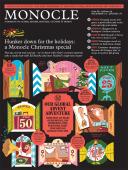
Issue 89
Hunker down for the holidays: a Monocle Christmas special. Feet up, curl up and read up – we sit down with Nato’s secretary-general, take a studio tour with Ed Ruscha and meet Madrid’s tough new mayor
In This Issue
Oops! No content was found.
Looks like we no longer have content for the page you're on. Perhaps try a search?
Return Home

